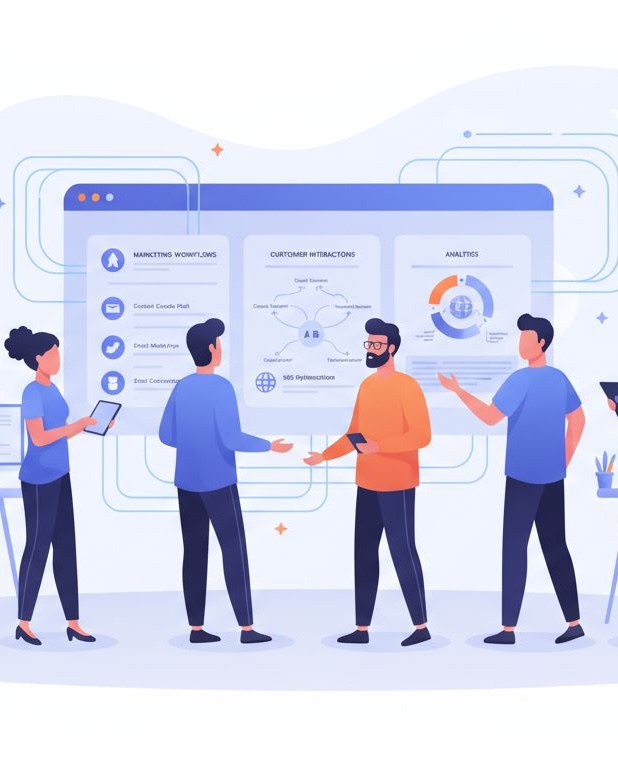Why Use Website Builders: Complete Guide for 2025

Over 73 percent of small businesses now use website builders to launch their digital presence, showing just how fast these tools have changed the game. Anyone can have a polished site without needing to write code, making online growth possible for more people than ever. With instant customization, smart design features, and flexible pricing, website builders are opening new doors for entrepreneurs eager to get online and start connecting.
Key Takeaways
| Point | Details |
|---|---|
| Website Builders Enable Accessibility | Modern website builders allow users to create professional websites without coding skills, democratizing digital presence creation for entrepreneurs and small businesses. |
| Diverse Options Available | Two main types of website builders—online proprietary and standalone applications—are available, catering to different user needs and technical comfort levels. |
| Cost-Effective Solution | Compared to traditional web development, website builders significantly reduce costs and time-to-market, providing a more feasible option for businesses. |
| Be Aware of Limitations | Website builders have constraints including template restrictions and platform lock-in, necessitating strategic planning to ensure long-term digital success. |
Table of Contents
- Defining Website Builders And Their Purpose
- Main Types Of Website Builders Explained
- Core Features And Automation Benefits
- Cost Comparison Versus Traditional Development
- Common Pitfalls And How To Avoid Them
Defining Website Builders and Their Purpose
Building a website used to require specialized coding skills. Not anymore. Website builders have transformed digital creation, enabling entrepreneurs and businesses to launch professional online presences without deep technical knowledge. According to Wikipedia, these are tools that allow users to construct websites visually, eliminating the need for manual code editing.
Modern website builders go far beyond simple drag-and-drop interfaces. They represent a no-code revolution that democratizes web development. As research from TYN Magazine indicates, these platforms are evolving toward AI-driven personalization and performance-focused experiences. Key capabilities now include:
- Instant visual design customization
- Responsive mobile layouts
- Built-in SEO optimization
- Integrated marketing tools
- One-click publishing
For entrepreneurs and small businesses, website builders offer an unprecedented opportunity to establish an online presence quickly and professionally. They remove technical barriers, allowing creators to focus on content, design, and business strategy rather than wrestling with complex coding requirements.
 The result? Faster deployment, lower costs, and increased accessibility for digital entrepreneurship.
The result? Faster deployment, lower costs, and increased accessibility for digital entrepreneurship.
Main Types of Website Builders Explained
Website builders have diversified significantly, offering multiple approaches to digital creation. According to Wikipedia, two primary categories dominate the market: online proprietary builders and standalone application software. Each type serves different user needs and technical comfort levels.
Online Proprietary Builders
These are hosted solutions with visual editors integrated directly into web hosting platforms. They provide an all-in-one experience where design, hosting, and publishing happen in a single environment. Key characteristics include:
- Instant website deployment
- Integrated hosting services
- Limited but user-friendly customization
- Typically subscription-based pricing
Standalone Application Builders
Desktop WYSIWYG (What You See Is What You Get) editors offer more design flexibility. These tools allow deeper customization and can export websites to various hosting platforms. Research from TYN Magazine highlights emerging subcategories in 2025:
- Visual page-builders with AI design assistance
- Drag-and-drop platforms
- Hybrid visual-code development tools
- AI-first generators creating entire layouts
The evolution of website builders means entrepreneurs now have unprecedented choices. Whether you need a quick, template-based site or a highly customized digital presence, there’s a builder designed to match your specific requirements.
Here’s a summary of the main types of website builders:
| Type | Hosting Model | Customization Level | Typical Users |
|---|---|---|---|
| Online Proprietary | Hosted (cloud) | Limited, user-friendly | Beginners Entrepreneurs |
| Standalone Application | Self-hosted/export | High, flexible | Designers Advanced users |
| Hybrid AI-Driven Builders | Varies | High, AI assistance | Tech-savvy creators Startups |
Core Features and Automation Benefits
Website builders have evolved from simple design tools to sophisticated digital creation platforms that leverage advanced automation and intelligent technologies. According to research from TYN Magazine, AI features are transforming how entrepreneurs and businesses develop their online presence, reducing manual design effort and enabling unprecedented personalization.
Intelligent Design Automation
Modern website builders now offer smart capabilities that dramatically streamline the creation process. These intelligent features include:
- Automatic layout optimization
- AI-powered design suggestions
- Dynamic content recommendations
- Performance and SEO adjustment suggestions
- Responsive design across multiple devices
Performance and Personalization Benefits
Beyond basic design, these tools now focus on creating adaptive digital experiences. The automation goes far deeper than visual design, incorporating smart algorithms that:
- Analyze user interaction patterns
- Suggest content improvements
- Automatically adjust page elements for maximum engagement
- Provide real-time performance insights
For entrepreneurs and small businesses, these advances mean less time wrestling with technical details and more time focusing on core business strategies. The result is faster deployment, smarter design, and websites that continuously improve themselves.
Cost Comparison Versus Traditional Development
Choosing between website builders and custom development has significant financial implications for businesses. According to Dorik, website builders offer a dramatically different cost structure compared to traditional web development, with substantial savings in both time and money.
Cost Breakdown
The financial differences are stark. A comparison of development approaches reveals:
Website Builders:
- Monthly costs: $4 - $159
- Launch time: 1 - 2 weeks
- Total initial investment: Minimal
Custom Development:
- Upfront costs: $5,000 - $50,000
- Development time: 8 - 12 weeks
- Ongoing maintenance: Higher technical expenses
Time and Resource Efficiency
Research from TechRadar highlights the economic advantages of website builders. The average monthly cost ranges between $21 - $26, plus domain expenses, compared to potentially tens of thousands in custom development. This represents not just a cost saving, but a significant reduction in complexity and resource allocation.

For entrepreneurs and small businesses, website builders offer an unprecedented value proposition. They eliminate the need for expensive development teams, reduce time-to-market, and provide professional-quality websites at a fraction of traditional development costs. The result? More resources to invest directly into business growth and innovation.
Common Pitfalls and How to Avoid Them
While website builders offer incredible convenience, they’re not without potential challenges. Strategic planning can help entrepreneurs navigate these potential roadblocks and maximize their digital potential. According to Dorik, understanding platform limitations is crucial for long-term success.
Platform Constraints
Website builders often come with inherent limitations that can impact your digital strategy. Key potential pitfalls include:
- Template design restrictions
- Limited custom functionality
- SEO optimization challenges
- Potential migration difficulties
- Platform lock-in risks
Strategic Mitigation Approaches
To successfully navigate these challenges, consider the following proactive strategies:
- Choose platforms with robust export capabilities
- Select builders offering significant customization options
- Plan for potential future migrations
- Understand each platform’s long-term scalability
- Maintain content backups and independent documentation
The most successful entrepreneurs view website builders as dynamic tools, not permanent solutions. By anticipating potential limitations and maintaining flexibility, you can create a digital presence that grows alongside your business. Adaptability is key. Regularly reassess your platform’s capabilities, stay informed about emerging technologies, and be prepared to pivot when your current solution no longer meets your expanding business needs.
Give Your Business an Unfair Advantage With the Future of Website Building
Are you tired of running into the same roadblocks with basic website builders? You want rapid deployment, AI-driven automation, and the flexibility to scale—yet most tools lock you into restrictive templates and slow you down with complex piecemeal solutions. The article above highlights the urgent need for smarter digital tools that empower entrepreneurs and agencies to stay ahead in 2025—without the hassle of coding or expensive custom development.

Experience what true digital transformation feels like with We.inc. Instantly build high-converting websites, automate your marketing with built-in AI chatbots, and manage all your social accounts in one dashboard. No more juggling multiple platforms or battling technical barriers. Whether you’re an individual entrepreneur or managing clients as an agency, We.inc lets you launch quickly and scale with confidence. Get started today and join the movement of digital creators who refuse to settle for outdated website builder solutions. Your all-in-one growth toolkit awaits at We.inc.
Frequently Asked Questions
What are website builders and why are they used?
Website builders are tools that allow users to create websites visually without requiring coding skills. They enable entrepreneurs and businesses to establish a professional online presence quickly and efficiently.
What types of website builders are available?
There are two main types of website builders: online proprietary builders, which are hosted solutions offering all-in-one services, and standalone application builders, which provide more customization and can export websites to various hosting platforms.
What are the key features of modern website builders?
Modern website builders offer features like instant visual design customization, responsive mobile layouts, built-in SEO optimization, integrated marketing tools, and smart automation capabilities that enhance design and user experience.
How do website builders compare in cost to traditional web development?
Website builders typically have lower costs, ranging from $4 to $159 per month, and can launch websites within 1 to 2 weeks. In contrast, custom web development can cost between $5,000 and $50,000 and take significantly longer to complete.
%20(1).svg)

